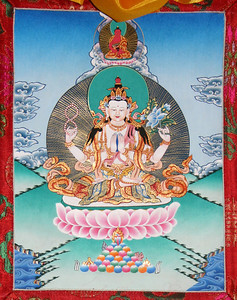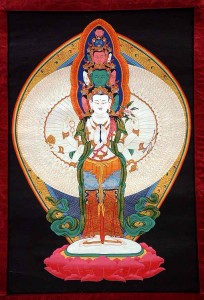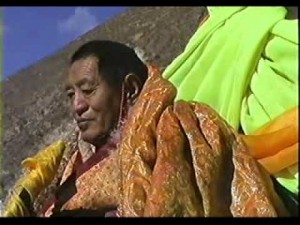The following is a musical offering of the Palyul Prayer by Jetsunma Ahkon Lhamo:
 Jetsunma Ahkon Lhamo
Jetsunma Ahkon Lhamo
Eyes Wide Open
An excerpt from a teaching by Jetsunma Ahkon Lhamo from the Vow of Love series
You may ask, “Why do I have to think about suffering? Why is it that the Buddha talks about suffering and nobody else does? Why is it that today’s New Age thinkers are saying, ‘I want to be me. I want to be free,’ and the Buddha is still talking about suffering after thousands and thousands of years?” It is because the Buddha has a teaching that is very logical and very real.
If we want to exit a room, but there is a chair between us and the door, we have a number of choices. We can say that the chair is not there. We can pretend that the chair is not an obstacle to our passing through the room and that it’s not important. Or we can notice that the chair is there and get on with our journey by walking around it. That is the essence of the Buddha’s teaching. The Buddha doesn’t stop at saying, “There is suffering.” The Buddha follows that by saying, “There is a way out of suffering.” And that’s the ticket. You cannot motivate yourself to follow the path out of suffering until you generate the commitment through the realization of suffering. You can’t make yourself walk around the chair to get to the door until you face the fact that the chair is blocking your way. You have to look at the chair.
It isn’t only about walking around a chair so that you can get to the other side of the room, so that you can get out the door. There’s more to it than that. You must understand that your commitment is two-fold. In order to become the deepened practitioner that you must be, to really sink your teeth into the Buddhadharma, you must have compassion for others that is so strong and so extraordinary it will nourish you even when you are dry.
© Jetsunma Ahkön Lhamo
Compassion: Foundation Of The Path
An excerpt from the Vow of Love Series by Jetsunma Ahkon Lhamo
In a superficial way the idea of compassion can seem very simple, and we might make the mistake of thinking that we understand it. But if we study compassion deeply, eventually we will come to understand that the ultimate view of compassion is enlightenment itself. It is the natural, primordial wisdom state itself. That’s why compassion isn’t truly known until we reach supreme enlightenment.
Compassion is the foundation of the Buddhist path. Without it, like any house that does not have a firm foundation, the house will crumble. It will not stand. One’s motivation to practice must be compassion. If your motivation is not compassion, it will be very difficult to firmly stick to the commitment to practice and meditate every day. I feel for those who say, “I’d really like to practice. I would really like to have a time in my life everyday to meditate, and yet I don’t have the discipline. I don’t have the strength. I don’t have the commitment.” If you have the right motivation, if you want to do this solely and purely from the point of view of compassion, you will find the time and you will find the commitment and you will find a way to do it. For those who have tried to meditate everyday or be consistent in their practice, if they can’t do it, my feeling is somehow the foundation of compassion isn’t strong enough.
If we could make the idea of compassion so strong that it becomes a burning fire consuming our hearts, until we are nothing but a flame. If the need to benefit others becomes so strong that it’s irresistible. If the understanding that others are suffering so unbearably in realms that we cannot even see, let alone the realms we can, that we cannot rest until we find a way to be of some lasting benefit to them. If these things can truly become part of our minds, we will find the strength to practice.
How do you find the strength to breathe? “Well,” you say, “that’s easy. Breathing is a reflex. I have to breathe. If I don’t breathe, I die.” What if you could cultivate the understanding that all sentient beings are filled with suffering that is inconceivable in its magnitude and that there are non-physical realms of existence we are not even aware of, filled with suffering? What if you could cultivate this understanding so deeply that, because of your realization, compassion and profound generosity became as much a reflex as breathing? That is possible.
“Well,” you say, “I don’t have that kind of understanding. I’m just not like that. I can’t make myself really buy into that.” Let me comfort you with this awareness. Unless you are supremely enlightened you are not born with that perfect understanding. No one is. No one is born with enough understanding of the suffering of others, and an affinity with the idea of compassion, to create that perfect discipline naturally. That understanding comes only through its cultivation, and we must cultivate that understanding consistently every day.
Cultivating Selfless Compassion
An excerpt from a teaching by Jetsunma Ahkon Lhamo from the Vow of Love series
It’s almost impossible to attain the goal of selfless compassion, where you commit every fiber of your being to benefiting all sentient beings, seen and unseen, without a moment’s hesitation. It’s almost impossible to develop the kind of compassion where you understand that all sentient beings are revolving helplessly in such suffering that they can’t bear it, and you can’t bear to think it’s going on, without cultivating a deep understanding of suffering. You want to avoid the trap of making the very same prayers that the selfishly motivated person might do, but instead have the idea that you want to be a great Bodhisattva.
One goal will produce lasting results and the other will not. The person with the motivation of selflessness has the key. Through extraordinary, selfless compassion, that person has the strength to persevere through everything until he or she is awake. That person will persevere until he or she has completely purged from his or her mind even the smallest, gossamer thin seeds of hatred, greed and ignorance. The person whose motivation is to be the ‘good person’ will not be able to do the same for any length of time. The foundation isn’t strong enough. That person may need some kind of feedback, or warm fuzzies as reward for being good. Even tried and true Buddhists will find this impure motivation in your minds. Even our ordained Sangha will find that they, themselves, will have dry periods. You’ll go spiritually dry, bone dry, and you’ll think, “What am I doing here? I can’t go on; it’s just too hard.” Then the next day, you’ll wake up and you’ll think, “Another day…good.” You’ll have all these different feelings that are just so common. Everybody, everybody has them. You don’t have to be a Buddhist to have these feelings.
Why does it flip flop back and forth? Because you have not built the firm foundation of very pure, selfless compassion. You need to cultivate it every single moment. You need to get yourself past the point where you need warm fuzzies to keep you going. If you are only looking at the symptom of suffering and trying to manipulate your environment to turn suffering around, you will always need feedback. That feedback may or may not come. Your compassion, your love should not depend on that.
© Jetsunma Ahkön Lhamo
Everything Counts
From The Spiritual Path: A Compilation of Teachings by Jetsunma Ahkon Lhamo
No two people experience anything exactly alike, ever. It’s almost as if we see through different-colored glasses. Even the same person can experience the same event quite differently on different days. Something that bugs the potatoes out of you one day will roll right off your back the next. This is due to the ripening of your karma at the time. It ripens in slightly different ways at every moment, creating a different inner experience. A tapestry is being woven, interdependently arising. Your mind is not the same today as it was yesterday, because different karma has ripened. The threads of the tapestry are different, but your ego-clinging makes it seem the same.
Some indigenous peoples do not use the word “karma” but acknowledge that if you take something from Mother Earth, you must return something. For instance, American Indians believe that you may cut down a tree because you need the wood, provided you repay or replenish the earth. If you don’t, there is a hole that nature or Mother Earth must fill. Additionally, the imbalance you cause in the environment will be played out somehow in your life—in mind or in body, but especially in your spirit.
This idea is very similar to the concept of karma. Had we grown up with the belief that cause and effect cannot be altered, that this is a universal law that, whether we are caught or not, there will sooner or later be a payback for every situation—we would have an entirely different culture. We would not have damaged the ecological system, while disregarding the consequences. Though concern is growing, we still abuse the environment and our natural wealth. We constantly make deals promoting personal gain. This is not wrong unless we take from others with no regard for their welfare. But we applaud business deals that benefit us and hurt others. Getting ahead is the American way. “That’s politics,” or “That’s business,” we say. We have learned to condone selfishness, totally disregarding its impact on our minds.
As we “learn” that for some things there is no payback, a poison gradually infiltrates our mindstreams. Many powerful people profess traditional religious beliefs yet complacently engage in graft, bribery, obstruction of justice, embezzlement, and lying. Believe me, if the first people to cut down a rain forest (or to bring a species close to extinction) had been struck by lightning, there would be no ecological problem today. If the earth had opened up and swallowed the owners and operators, there would be no problem with strip mining. But the payback is often slow in coming. We remain unskilled in connecting causes with their inexorable effects.
Suppose you go to a party at someone’s house and see some perfume samples. You think: “They have lots of these, so I’ll just take one. It’s no big deal. Surely if I asked, they would give it to me.” Later you go to a grocery store and think: “Gee, I’d really like one of those cookies. Just one, because if I buy the whole pack, I might get fat.” Then you notice a pack that is broken open. “Well,” you think, “it’s already open, so I’ll just slip one little cookie out. The store can’t sell them now, anyway. They have a budget to cover that.” Even if no one misses the perfume or the cookie, you have changed in your mindstream. The change is subtle. But you have changed. And if you continue to act that way, your mind will become hard. It must—because something inside of you knows what is right and what is wrong. Something inside you is very moral. There is a sensitivity to things balancing out. It may not be the part that you can listen to, but karma, the potential for karma, the reality of karma, the interaction of karma—exists in the mindstream of every sentient being.
© Jetsunma Ahkön Lhamo
The Illusion Of Power
The following is an excerpt from a teaching by Jetsunma Ahkon Lhamo called “Bringing Virtue into Life”
A lot of people play the power game of trying to gain power and domination over other people simply because they feel if they can control others it will make them happy. They will be powerful. They will be shielded from hurt because they are dominant. Others are weaker than them and they don’t care whether they hurt the people under them or not. They do whatever they want to do in order to make themselves happy. That’s what people do. What they don’t realize is that in every conceivable sense they are making themselves more and more unhappy. That kind of power over others will never produce happiness. In some future time that very person who is such a power monger will be the most powerless of sentient beings. Think about the helpless little creatures that are kept in cages in pet shops to be sold to who knows. Think about the helpless little creatures that are kept in laboratories to be tested on for who knows what purpose. That kind of helplessness. So we are talking about curable suffering and unhappiness and we bring it on ourselves through cause and effect relationships. This is one of the teachings that the Buddha has given us that is very, very logical, and we can see small examples of it within our lives. If we engage in non-virtuous behavior, it will produce unhappiness.
Copyright © Jetsunma Ahkon Norbu Lhamo. All rights reserved
Generating The Deity

From The Spiritual Path: A Compilation of Teachings by Jetsunma Ahkon Lhamo
As you generate yourself as a Buddha or Bodhisattva, reciting mantras and devotional prayers, your mind arises as a pure form. This is different from the ordinary mind that struggles to wake up each morning, dragging along its ego-clinging baggage or karma and looking for happiness in futile ways. This pure form is an expression of pure cognition, free of conceptualization and limitation. It is pure awareness, a state of pure luminosity. The deity we generate is an expression of that pure state. All phenomena are understood to be the deity’s body, voice, and activity. Thus, phenomena cease being something we grasp.
Generation-stage and completion-stage practice disassemble the entire time-and-space grid, disassemble the moment itself. You dissolve into emptiness and purify all things into their natural state. Thus, the mind relaxes from the tension that is gathered around “I,” and it becomes possible to reconstruct the moment naturally through the creation of the mandala and through allowing the mind to arise as the deity. This great skill is accomplished when the entire process becomes effortless.
“How,” you may ask, “can it be effortless? The mandala, the whole process, seems very complicated.” Actually, it is less complicated than what you are currently perceiving. You have a mandala going right now. Look around you. You sit on a world that sits in a galaxy that sits in a universe, and it is all lit up. How do you ever manage to conceive it? And on top of that, you pay your electric bill, call people on the phone, feed your pets and yourself. You enter a metal thing that flies through the air from one place to another. It is an extremely complicated mandala. In addition, you are constantly moving through a chain of lives in six major realms in a completely un-predictable pattern.
The generation of the deity is far easier. It is natural and spontaneous because it is not built on the assumption of ego. It is not constructed of tension because the deity is understood to be real but insubstantial. It is understood to be that which does not need to be constantly maintained. The tension of survival associated with desire and egocentricity is not there. With the continuation of this practice and the skill developed through good concentration and an effortless effort, all perception is purified. The five senses are not given their lead. They are not permitted to feed back information that satisfies the need of self to be self. They are purified by the mind naturally arising as the deity. The karma of endless cycles of birth and death is purified at last.
© Jetsunma Ahkön Lhamo
The Purpose Of This Life: HH Jigme Phuntsok
The following is an excerpt from a public talk given by His Holiness Khenpo Jigme Phuntsok:
The Buddha taught that true happiness and peace can never be found through material gain, and the only way that one can truly be satisfied is to realize this point. Therefore it is very important for all of you to consider decreasing your attachment to the objects of this world, to all apparent phenomena, and to understand that more important than spending most of one’s time pursuing the material world and thinking that happiness can be found in this way, we should try to practice pure Dharma. Not only that. To be too attached to friends, family members, even our children and our spouses, those whom we cherish, thinking that it is only through our relationships with them that we can have happiness, is only going to bring us more suffering. This is also a source of suffering, since we will be distracted having to figure out how we can bring food to the table and get clothing for our offspring and all of the other necessities that one has to completely fill one’s mind with. The details of survival for family and friends will completely distract one from the benefits of purely practicing Dharma.
Regarding the wish for fame and glory: Those who don’t have it suffer because they don’t. Those who are poor and those who have no position at all are always having some expectation that somehow and in some way they may be able to rise above this circumstance and achieve a position of fame and glory. Those who are already in positions of fame, glory and leadership are always suffering from the fear that they are going to lose their positions. So in both cases the suffering is more or less equal. On this point I would like to say that probably here in this place there are those who are very, very poor and there are those who are very, very wealthy and in high positions, and there is quite a big space between them. I was thinking that those who are in the high positions are probably suffering even more than those who are poor. The reason for that is because those who are poor—except for the fact that they are always having some kind of an expectation that someday they may become wealthy or in a better position—probably have enough to survive, are getting along sort of all right. And the mental suffering that they endure is not too extreme, except for that expectation or wish. But those who are in high positions are probably suffering much more because they are always fearful that they are going to lose their positions, that they will fall down to a lower place. So their minds are filled with doubt and paranoia and anxiety. In this way they suffer more than the poor people.
The nature of suffering is twofold: Suffering is caused by delusion and by karmic propensities. When we speak of delusion, it refers to three root conflicting emotions: desire-attachment, anger or aggression, and delusion itself, stupidity. Let’s look at desire-attachment first. Now this conflicting emotion fixates itself upon objects, objective appearances, such as material things, fame, status or other human beings or individuals. Wherever it fixates, then if one allows oneself to become controlled by that emotion, then the only result will be unceasing suffering or discontent.
Anger or aggression is a conflicting emotion which causes one to feel that one actually wishes that others will suffer. That which brings up this conflicting emotion of aggression is due to the desire-attachment that we have for ourself and those that we are already attached to because if anyone else tries to harm them, then those other people who are trying to harm our loved ones or friends are termed enemies, and we feel aggression towards them and wish that harm would come to them. As soon as we enter into this type of emotional battle, the only result is unceasing suffering.
That which is termed delusion or stupidity is the inability to understand or recognize what should be accepted, what should be rejected, what should be accomplished and what should be abandoned. Inner divisions of delusion include misunderstanding and incorrect understanding. The first of these inner divisions of delusion, misunderstanding, could also be interpreted as misunderstanding, or misusing, the ultimate purpose of this life. The way that that would qualify is that one would have to be born as a human being anywhere in this world who never really understands the difference between that which is wholesome and that which is unwholesome, never having any real kind of ability to discern what should be accepted in order to produce true, positive results and what should be rejected—basically just spending one’s life aimlessly living like a cow or a horse which can graze and eat grass and just kind of survive. The difference between a cow or a horse and a person who is just kind of aimlessly surviving is maybe the person is able to put on clothes and other kinds of comfort. But really the point that is being made is that this person who misunderstands the purpose of life is wasting his or her opportunity because they dwell in this state of delusion, the delusion of misunderstanding what should be done with life.
What The World Needs Now
The following is from a series of tweets by Jetsunma Ahkon Lhamo:
Many of us remember a song recorded by I think- Dionne Warwick called “What the World Needs Now” (is Love Sweet Love) many years ago. The song is now thought of as “pretty”, but too old to be current. And Ms. Warwick’s voice – wow.
These days, everybody is “hip” and “cool” and too “chill” or “real” to be warm, and loving, to have a tender and generous heart. Instead we think we must be tough to get by. Why is that? When did kindness and compassion, respect for others go out of style? I feel it is good to examine ourselves with true honesty and pure intention. No one can afford to stop growing, and self-honesty is the way to go.
When people are hard and unable to open up it is mostly due to fear and ego protection. We are afraid of being hurt, rejected, and disrespected. So warmth is seen as weakness and vulnerability. It isn’t. Quite the opposite. Strong people can afford to serve others, to bow down and wash the feet of others. That takes a true “warrior for love,“ a true inspiration for humankind.
Most of us talk tough sometimes, and tough love is sometimes needed. Not that often, though, and not for long. If you want to do that, however, you are bound by ethics to take the time to truly study where this person is coming from. What they have been conditioned by. In other words you must learn about them, and reach a point of empathy. The old Native American adage- “Walk a mile in their shoes” before we give ourselves permission to be tough with them. You don’t know, we don’t know, what open wounds we are seeing. Also it is no good to advise others or have authority over them if you do not love them and tolerate their coping methods and their pain. Maybe we think the person deserves our rage. Let me let you in on a secret: we are all the same nature and none of us deserve hatred. None. Even to be born human we are worthy. As are all sentient beings who are unable to ask for kindness.
It is up to us to demonstrate and put into play our capabilities and our contribution. To gather a controllable circle of “yes Sirs” is not love, strength, power, goodness, or anything like that. It is false. It is not love and not power. It is blatant fear and the need to dominate others. We were not made to dominate. No sentient being is. We were meant to love and live together in harmony. Let’s do it together!
OM MANI PEDME HUNG
OM TARE TUTTARE TURE SOHA
©Jetsunma Ahkön Norbu Lhamo
The Law Of Gravity And Karma: The Seed And The Fruit
The following is an excerpt from a teaching by Jetsunma Ahkon Lhamo called “Bringing Virtue Into Life”
Denial, in my opinion, is much worse than how fast our lives go. If we have even a meager life span of sixty years, if we really got it, if we really understood cause and effect, we would probably be motivated to start practicing early; and by the time that we were sixty and ready to die, we’d have something accomplished. We would have prepared for our next rebirth. But we don’t do that because we cannot connect the dots. We wait.
I think about the young people that I know, and even the young people that are very close to me. They have the idea that they have all the time in the world. I know because I used to have that idea. All the time in the world. It’s like Friday night. You’ve got the whole weekend so party hearty. It’s really like that. We really have this idea. So when we’re young we do not begin our practice. And then when we’re not so young, when we move into real adulthood, we still are in denial. I tell you when we’re finished being young, the next stage is to pretend that we’re young. That’s the next thing that we do. And then after pretending that we’re young doesn’t work, we imagine that we’re young. It’s sort of like that. We keep pushing off the inevitable, which is that moment when we get that life is really passing and something must be done.
This kind of narcotic quality that is part and parcel of samsaric existence is the real enemy here. It is the real enemy. It causes us to think very strangely, in an odd way, a way that is not productive and is not protective and beneficial toward ourselves. We are not being our own best friends in other words. So what happens is we are deluded, we are stuck. We stay without any understanding. We simply cannot commit to practice. We have this Scarlet O’Hara kind of idea, that tomorrow is soon enough. Tomorrow everything will be fine. So we find ourselves in something of a bind.
A person who has not been able to practice these thoughts that turn the mind toward Dharma is in the most trouble because they can’t move to the next step. That’s the next thought that turns the mind towards Dharma, and it’s a very simple one. It’s actually very logical. It’s about as logical as the law of gravity seems to be, and the law of gravity seems to be pretty logical. Drop it and it goes down…every time that I’ve seen. Show me something different, but every time I’ve seen it. The law of gravity is kind of logical. , I don’t know the physics of it, but, basically it means that this is heavier than the air that it displaces so it’s going down. And the earth will pull it down because of the magnetic quality that the motion of the earth produces. So we understand that this is very logical.
But there is another logical truth that we are missing completely. It’s just as logical, equally as logical, but again we’re playing the game of forever young, never gonna die and always deluded. That’s the game we’re playing. And here’s the truth that is logical, the truth that we’re missing that is so simple. If you think about it, you know it’s true and it’s this: Non-virtuous behavior, such as killing, stealing, adultery, judgment, lack of kindness, lack of generosity, harming others, lying, these kinds of activities bring about unhappiness, every time. There is no case in which you can engage in nonvirtuous behavior in order to produce happy results. It will never happen. It will never happen. In the same way that apple seeds will not grow orange trees, it simply doesn’t happen.
Nonvirtuous behavior, negative behavior, will always, every time, bring unhappiness. The funny thing is we always engage in nonvirtuous activity in order to bring us happiness. That’s what we think we’re doing. We lie about somebody else so that, let’s see… Here’s a good example: Let’s say that I have a boyfriend and my boyfriend loves two women. I’m one of them. So I might, in order to bring about my own happiness, lie about that other woman and say “Oh, she’s no good. You don’t want her. She’s no good.” I might lie about that other woman so I can have this boyfriend. I’m thinking that this lie is going to bring me happiness. It’s never going to happen. It’s never going to happen, because eventually what’s going to happen is this: Someday you’re going to want something very much. Someday you’re going to be completely and totally entitled to something, and that person will be able to keep it from you. You see? It may not happen in this lifetime. It may not happen in the next lifetime. It could happen 10,000 lifetimes from now, where you couldn’t possibly remember, but it will make you unhappy. Eventually it will make you unhappy.
Copyright © Jetsunma Ahkon Norbu Lhamo. All rights reserved







